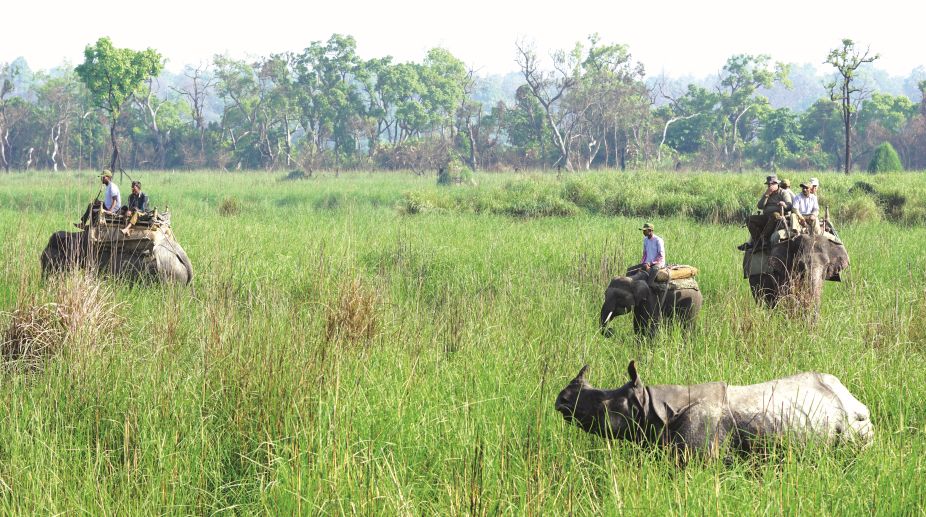Over a period of five days, on 9-13 April, three female and one male greater one-horned rhinoceros (Rhinoceros unicornis) were translocated from the Rhino Ranging Area, Kakraha in South Sonaripur, with the aim of establishing a second rhino rehabilitation area at Bhadi, within the Belrayan range of the Dudhwa National Park.
Captured through chemical immobilisation and transported in specially-designed crates on trucks to the second rhino rehabilitation area under veterinary assistance, the four rhinos have been released in an enclosure at Belrayan range, the World-Wide Fund for Nature (WWF-India) has informed.
Advertisement
The rhinos are being monitored continuously by the staff of Dudhwa National Park, UP Forest Department, with support from partners.
This initiative aims to establish a second rhino population by expanding their range within the Dudhwa National Park, and further reduce risk of disease and in-breeding.
The translocation programme has been undertaken after a span of 34 years in the state. The first batch of rhinos was captured in Assam to be released in Dudhwa in 1984, comprising two males and three females.
Four more females from Nepal were added to the population of Dudhwa in the next year. The rhino population in Dudhwa has demonstrated a positive trend of growth and as of March 2015, the population stands at 32.
The Uttar Pradesh Forest Department, in collaboration with WWF-India, with the support of the Assam Forest Department and Wildlife Trust of India (WTI), undertook the translocation of four rhinos, which is a significant landmark in the history of rhino conservation in Uttar Pradesh.
Speaking about the rhino introduction in Dudhwa National Park, Sunil Chowdhary, Field Director, Dudhwa National Park said, “This is a landmark event in the history of Dudhwa National Park in particular. The Belrayan range has been found very suitable for rhinos and their new presence in the range will ensure that the rhino population of Uttar Pradesh continues to grow. The rehabilitation in Dudhwa has been a successful effort because of the hard work and courage of the rescue and capture teams and I congratulate all stakeholders on the same.”
Speaking about the successful introduction of the 4 sub-adult rhinos in Belrayan range of Dudhwa National Park, Mahaveer Kaujalagi, Deputy Director, Dudhwa National Park, said, “The introduction of rhinos in the new rehabilitation area in Dudhwa National Park is an achievement for enhanced management of rhinos involving all stakeholders.”
Commenting on the translocation process, Ravi Singh, Secretary General and CEO of WWF-India said, “The population of greater one-horned rhinos has been stable in the Terai region of Uttar Pradesh as a result of concerted efforts of the state Forest Department and various partner organisations in the state. We appreciate the efforts of the Field Director, Dudhwa National Park, and his team, partners and communities for their efforts to create a second home for rhinos in the Dudhwa National Park. WWF-India looks forward to strengthening joint efforts for conservation of rhinos in the Terai Arc Landscape with the Uttar Pradesh Forest Department. The present relocation is an important milestone in rhino conservation which needs careful monitoring and protection.”
WWF-India and the UP Forest Department have been preparing the ground for creating a rehabilitation area for rhinos since 2015. In preparation of this re-introduction, WWF-India’s field teams at the Dudhwa National Park have been monitoring the rhinos and working with the Park authorities to facilitate the translocation process. WWF-India has been supported in this effort by the US Fish and Wildlife Service and the WWF network.
SNS









